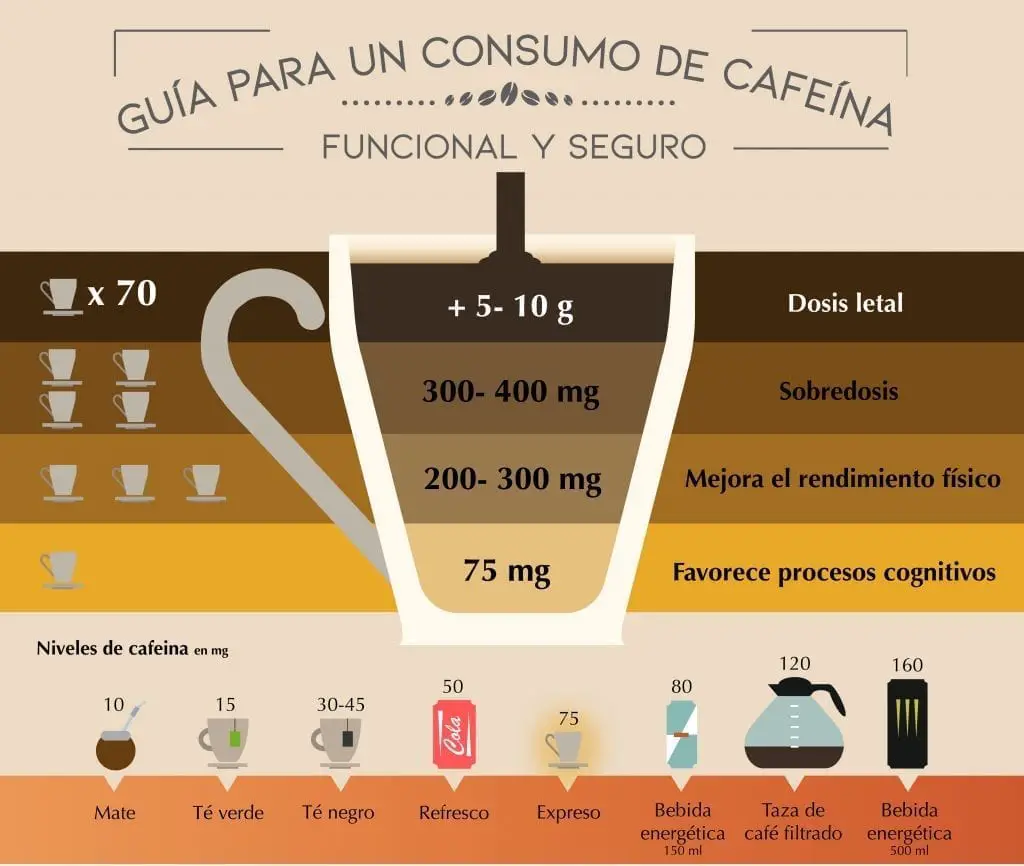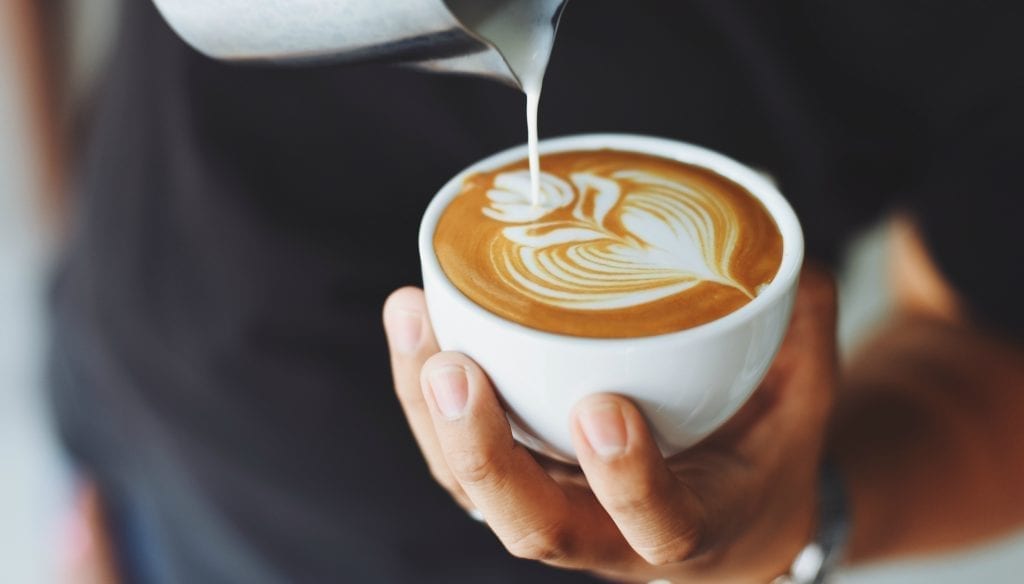Caffeinated beverages. Benefits, effects and more. Caffeinated beverages are usually a constant part of our daily lives, sometimes we have consumed some of them without knowing directly that they contain caffeine.
However, they are a companion of our daily life for different reasons. There are many controversies on the subject of caffeinated beverages and their impact on the health of the person who consumes them, some indicate that they are not good for health.
Others that they are necessary, what is certain is that all drinks consumed in excess can have serious health consequences.
En esta nota, encontraras lo siguiente
what is Caffeine?
Caffeine is a bitter substance that is found naturally in more than 60 plants, including coffee beans, tea leaves, kola nuts, cocoa pods, among others.
Most of the caffeine we consume comes directly from beverages.
what beverages contain caffeine?
There are many beverages that we consume on a daily basis, and there are a large number of people who wake up with a cup of coffee or tea.
Others prefer them for lunch, snacks or as an accompaniment to dinner, without knowing that in some way they are ingesting caffeine.  The main beverages containing caffeine are:
The main beverages containing caffeine are:
Coffee
The main source of caffeine par excellence is coffee, and it is probably the first product with which we associate this substance that gives many people energy and keeps them awake.
According to its type, the amount of caffeine present in it may vary. In an average cup of coffee we can find about 85 mg. of caffeine, which is why it is considered to be the main beverage containing this stimulating substance. Benefits that we can find when consuming coffee we have:
- Contains few calories
- May prevent Alzheimer’s disease
- Improves concentration
- Provides numerous antioxidants
Tea
Tea is one of the beverages with caffeine, and it naturally contains this substance that somehow generates energy to the body. According to the type of tea consumed, we will obtain a greater or lesser amount of caffeine, for example, black tea has 5 mg/100 ml. Benefits provided by the consumption of tea we can find:
- Contains antioxidants
- Attacks anemia
- It is diuretic
- Prevents coagulation
Soft drinks
Cola soft drinks are rich in caffeine, but they are not the only ones, lemon and orange soft drinks also contain caffeine, although in smaller proportions.
However, they are a constant in this refreshing drink that has so many followers, and with which caution should be exercised since their excessive consumption can have serious consequences.
Energy Drinks
Energy drinks are soft drinks to which caffeine has been added, and the amount contained in them can vary considerably according to the type consumed. Energy drinks may also contain sugars, vitamins, herbs and supplements.
Over the years, these drinks have become popular, especially among young people, who mix their energy drinks with alcohol, which can be harmful to their health. Caffeine can interfere with the ability to recognize how drunk one is, which can lead to drinking more and suffering accidents.
what are the effects of consuming caffeinated beverages?
The consumption of caffeinated beverages can be harmful as long as it is not controlled, since the body needs substances that are present in many foods, and beverages do not escape from this. However, the excessive consumption of any food can be detrimental to our health.  Caffeine, as we all know, is a substance that is usually a stimulant, it reaches its maximum level in the blood within an hour after consumption.
Caffeine, as we all know, is a substance that is usually a stimulant, it reaches its maximum level in the blood within an hour after consumption.
It has been demonstrated that a person can continue to feel the effects of caffeine for four to six hours after its consumption. Some of the effects of caffeine for the body are:
- Caffeine stimulates the central nervous system, which can make a person feel more awake by giving them a boost of energy.
- It acts as a diuretic, which means it helps the body get rid of extra water and salt by urinating more.
- Increases the release of acid in the stomach, which sometimes causes stomach upset or heartburn.
- May interfere with calcium absorption in the body, which can be harmful and lead to negative consequences.
- Increases blood pressure.
what are the side effects of consuming too much caffeine?
As previously mentioned, the excessive consumption of caffeinated beverages can be detrimental to health, since each organism presents different states.
Studies have shown that for most people, it is not harmful to consume up to 400 mg of caffeine per day, however if too much caffeine is consumed, it can cause health problems such as:
- Restlessness and tremors
- Insomnia
- Headaches
- Dizziness
- Increased heart rate
- Dehydration
- Anxiety
- Dependence
So it is recommended to consume caffeinated beverages in a controlled manner and in moderate amounts, since in this way we will avoid generating within our body unnecessary problems, in addition to the fact that the body does not need it to contribute to its basic functions.
what are the benefits of consuming caffeinated beverages?
Caffeinated beverages can have multiple benefits, since they are stimulants that contribute to feel energized and more active, as long as their consumption is moderate, they can provide us with positive effects such as: Theykeep us alert: Caffeinated beverages act on the brain, blocking a neurotransmitter, adenosine, which increases other substances such as dopamine or norepinephrine, which accelerate brain activity.
It is an antioxidant: caffeinated beverages have numerous nutrients that contribute to the proper functioning of our body, according to the type consumed we can find riboflavin, pantothenic acid, manganese, potassium, magnesium and niacin.
Decreases the risk of suffering from diabetes: Studies have shown that people who consume coffee have a 23 to 50% lower risk of suffering from diabetes.
Decreases the possibility of suffering from neurodegenerative diseases: Studies have shown that people who consume coffee could have a 65% less chance of suffering from Alzheimer’s, and between 32 and 60% of suffering from Parkinson’s disease.
Combats Depression: Beverages containing caffeine tend to stimulate the brain and generally provide energy to the body, which has led to studies that have shown that people who drink coffee or tea are less likely to suffer from depression.
Contributes to fat burning: Caffeine is present in most food supplements, and it is one of the few natural substances that help to burn fat as long as its consumption is in moderation.
how much caffeine can a person consume per day?
It is estimated, according to studies and research that have revolved around the consumption of caffeine, that a person can consume between 300 and 400 mg as the maximum amount of caffeine in a day, which is equivalent to 3 or 4 cups of coffee.  It can even be ingested through different foods and beverages, such as chocolate, tea and energy drinks. This also shows that many people unknowingly consume caffeine daily in their eating habits either directly or indirectly.
It can even be ingested through different foods and beverages, such as chocolate, tea and energy drinks. This also shows that many people unknowingly consume caffeine daily in their eating habits either directly or indirectly.
What is clear, and as in all cases, is that no beverage should be abused, since it can cause serious complications leading in some way to the appearance of suffering from diseases.
Therefore, it is recommended to be aware of the importance and complications of the indiscriminate consumption of caffeinated beverages.




